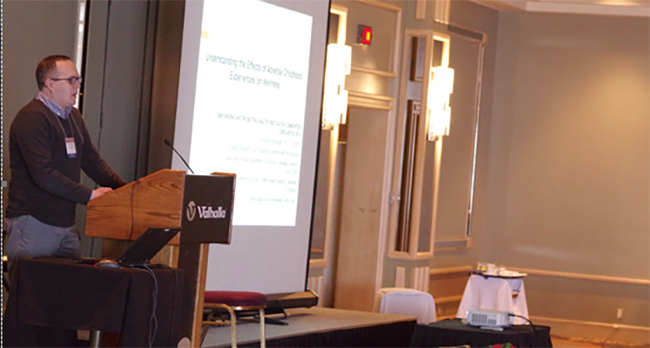Aakoziwin highlighted at Empowering and Promoting Health First Nations conference

By Rick Garrick
THUNDER BAY – The Anishinabemowin word for sickness – aakoziwin, which means out of balance, was highlighted during the opening presentation at Dilico Anishinabek Family Care’s Empowering and Promoting Healthy First Nation Communities conference in Thunder Bay.
“It’s a translation — it’s like you’re out of balance,” says Christopher Mushquash, clinical psychologist for Dilico, associate professor at Lakehead University and a Pays Plat citizen, during his presentation on Understanding the Effects of Adverse Childhood Experiences on Wellness. “It’s not that you’re ill, it’s that there’s some balance that has been upset. So health isn’t simply the absence of being ill, health actually means the presence of a whole bunch of other things in your lives.”
Mushquash also spoke about several foundations of wellness and how culture provides a framework through which wellness can emerge during his presentation.
“I talked about the foundations of wellness, both from a cultural perspective, that is in our lives having purpose, hope, belonging and meaning, but also from a biological perspective, that is ensuring we are getting the sleep we need, ensuring we are getting the appropriate food we need, that our time is structured in a way that facilitates health and that we are getting enough physical activity,” Mushquash says. “And then also from a psychological perspective, that is where we have to ensure we are doing the things that we need to do to regulate our emotions and not avoid things that cause us distress.”
Mushquash’s presentation also included the relationship between adverse childhood experiences and health and the importance of preventing adverse childhood experiences in First Nation communities.
“I talked about the adverse childhood experiences literature and what it might have to offer us in terms of thinking through how to support our Indigenous families and communities,” Mushquash says.
The conference, held on Feb. 20-21 at the Valhalla Inn, also included three other presentations: How You, Personally, can help Your Child Thrive by Following just a few Simple Principles by Adele Diamond; Hope after Violence and Trauma: Making Meaning of Relationship by Mary Rella; and Indigenous in the City: The Urban Indigenous Experience by Eddy Robinson.
“It is important to host the conference because it brings all of our partners, our First Nations, together annually to talk about and learn about the best and promising practices and interventions for our First Nations people,” says Tina Bobinski, assistant director of mental health with Dilico. “The theme of the conference this year was addressing violence experienced over the lifespan, so we (had) local and visiting champions in the field talking about the impact of violence and trauma and how to treat trauma and how to use culturally informed ways of working with our First Nations people when we help them heal.”
Six workshops were also held during the conference, including Traditional Family Roles from a Violence Prevention Perspective by Ron Kanutski, Kiaya Drake, Crystal Morrison, Levina Wavey and Janine Desmoulin.
“(We were) talking about our families, the traditional roles around our culture, our traditions, (and) also our own personal stories within how our roles have been affected from a lack of culture and now have been affected with culture in our life,” says Desmoulin, cultural wellness mentor with Dilico and a Biigtigong Nishnaabeg citizen.
The other workshops were: A Brief Overview of Indigenous Human Trafficking and Culture-based Trauma Informed Practices; Indigenous Way of Life-Suicide Intervention; Just Say Know; Women’s Traditional Skirt Making; and Motivational Interviewing.
Dilico serves 13 communities, including Biinjitiwaabik Zaaging Anishinaabek, Biigtigong Nishnaabeg, Fort William, Long Lake #58, Michipicoten, Pays Plat, Pic Mobert and Red Rock Indian Band.


